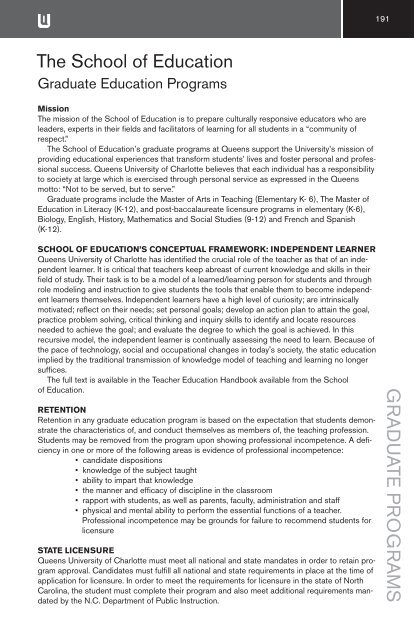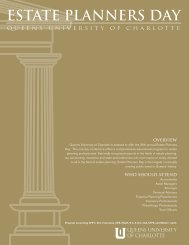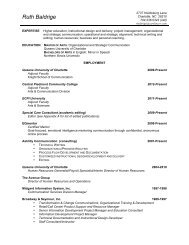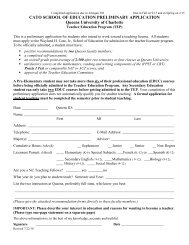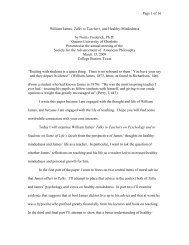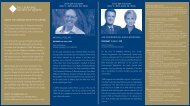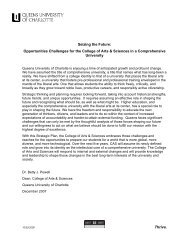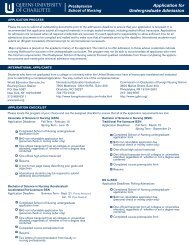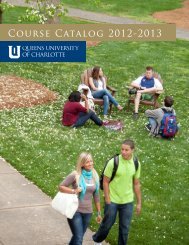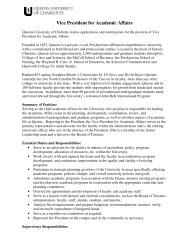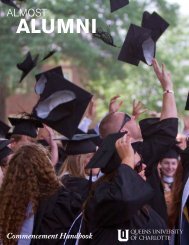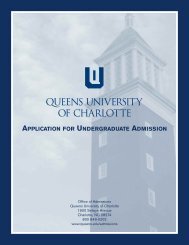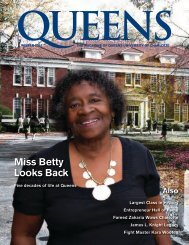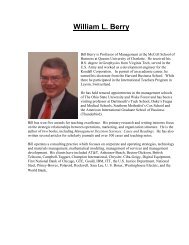2008-2009 Academic Catalog - Queens University of Charlotte
2008-2009 Academic Catalog - Queens University of Charlotte
2008-2009 Academic Catalog - Queens University of Charlotte
Create successful ePaper yourself
Turn your PDF publications into a flip-book with our unique Google optimized e-Paper software.
191<br />
The School <strong>of</strong> Education<br />
Graduate Education Programs<br />
Mission<br />
The mission <strong>of</strong> the School <strong>of</strong> Education is to prepare culturally responsive educators who are<br />
leaders, experts in their fields and facilitators <strong>of</strong> learning for all students in a “community <strong>of</strong><br />
respect.”<br />
The School <strong>of</strong> Education’s graduate programs at <strong>Queens</strong> support the <strong>University</strong>’s mission <strong>of</strong><br />
providing educational experiences that transform students’ lives and foster personal and pr<strong>of</strong>essional<br />
success. <strong>Queens</strong> <strong>University</strong> <strong>of</strong> <strong>Charlotte</strong> believes that each individual has a responsibility<br />
to society at large which is exercised through personal service as expressed in the <strong>Queens</strong><br />
motto: “Not to be served, but to serve.”<br />
Graduate programs include the Master <strong>of</strong> Arts in Teaching (Elementary K- 6), The Master <strong>of</strong><br />
Education in Literacy (K-12), and post-baccalaureate licensure programs in elementary (K-6),<br />
Biology, English, History, Mathematics and Social Studies (9-12) and French and Spanish<br />
(K-12).<br />
SCHOOL OF EDUCATION’S CONCEPTUAL FRAMEWORK: INDEPENDENT LEARNER<br />
<strong>Queens</strong> <strong>University</strong> <strong>of</strong> <strong>Charlotte</strong> has identified the crucial role <strong>of</strong> the teacher as that <strong>of</strong> an independent<br />
learner. It is critical that teachers keep abreast <strong>of</strong> current knowledge and skills in their<br />
field <strong>of</strong> study. Their task is to be a model <strong>of</strong> a learned/learning person for students and through<br />
role modeling and instruction to give students the tools that enable them to become independent<br />
learners themselves. Independent learners have a high level <strong>of</strong> curiosity; are intrinsically<br />
motivated; reflect on their needs; set personal goals; develop an action plan to attain the goal,<br />
practice problem solving, critical thinking and inquiry skills to identify and locate resources<br />
needed to achieve the goal; and evaluate the degree to which the goal is achieved. In this<br />
recursive model, the independent learner is continually assessing the need to learn. Because <strong>of</strong><br />
the pace <strong>of</strong> technology, social and occupational changes in today's society, the static education<br />
implied by the traditional transmission <strong>of</strong> knowledge model <strong>of</strong> teaching and learning no longer<br />
suffices.<br />
The full text is available in the Teacher Education Handbook available from the School<br />
<strong>of</strong> Education.<br />
RETENTION<br />
Retention in any graduate education program is based on the expectation that students demonstrate<br />
the characteristics <strong>of</strong>, and conduct themselves as members <strong>of</strong>, the teaching pr<strong>of</strong>ession.<br />
Students may be removed from the program upon showing pr<strong>of</strong>essional incompetence. A deficiency<br />
in one or more <strong>of</strong> the following areas is evidence <strong>of</strong> pr<strong>of</strong>essional incompetence:<br />
• candidate dispositions<br />
• knowledge <strong>of</strong> the subject taught<br />
• ability to impart that knowledge<br />
• the manner and efficacy <strong>of</strong> discipline in the classroom<br />
• rapport with students, as well as parents, faculty, administration and staff<br />
• physical and mental ability to perform the essential functions <strong>of</strong> a teacher.<br />
Pr<strong>of</strong>essional incompetence may be grounds for failure to recommend students for<br />
licensure<br />
STATE LICENSURE<br />
<strong>Queens</strong> <strong>University</strong> <strong>of</strong> <strong>Charlotte</strong> must meet all national and state mandates in order to retain program<br />
approval. Candidates must fulfill all national and state requirements in place at the time <strong>of</strong><br />
application for licensure. In order to meet the requirements for licensure in the state <strong>of</strong> North<br />
Carolina, the student must complete their program and also meet additional requirements mandated<br />
by the N.C. Department <strong>of</strong> Public Instruction.<br />
GRADUATE PROGRAMS


